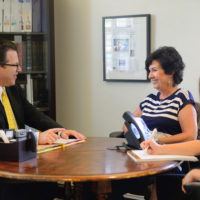What Happens If You Do Not Make it Home? The Need for Advance Planning
As we continue to hear of the staggering budget cuts to our court and social services systems, it is time for us to consider what we can do to lessen the impact of limited resources on us and our families. Florida’s social services network and judicial system will not have the capabilities to efficiently and effectively address surrogate decision making for adults or children.
Although we all want to believe we will never become incapacitated, a simple car accident, slip and fall, or other incident can cause the healthiest of people to lose their ability to make informed decisions. All persons over the age of 18 should formally designate someone to assist them with decision making if the unimaginable should happen.
Human nature dictates that most persons will not take the time to plan for incapacity. The need to designate someone as our surrogate decision maker only increases as we grow older, since the ability to make informed decisions may become hindered with the effects of aging. The need is further complicated as we may have also acquired assets and have family members who depend upon us.
In addition to durable powers of attorney and health care surrogate documents, it is important to put your estate planning wishes on paper as well. Nobody likes to think about their own mortality, particularly if you have young children. Well intentioned parents secure child care for evenings out or trips away but few secure the wellbeing of their family if the worst should happen. A critical component of being a responsible parent, young or old, is ensuring loved one’s personal and financial needs are met when the parent can no longer do so.
Unexpected life-altering injuries occur every day and permanently incapacitate or result in death. All persons over the age of 18 should formally designate someone to assist them with decision making if the unimaginable should happen. Advance directives are one way to make that designation. An advance directive is a witnessed written document or oral statement in which you express your wishes concerning your health care. Because people don’t take this important step, the demand on the social services and judicial systems will continue to grow. To keep Floridians out of “the system” we need to emphasize the importance of planning. In addition, parents need to choose, while they have the ability, who will care for their children so the court does not have to later.
When people do not take the time to designate a surrogate decision maker, and they become incapacitated, chances are good they will end up in the guardianship system until they pass away. Guardianship is the court process designed to protect and exercise the legal rights of individuals who lack the capacity to make their own decisions and have not made plans to address this possibility. Guardianship is expensive, time consuming and very intrusive.
No matter what our age or current health, it is never too early to plan. Every person over age 18 should have an advance directive and every parent of a minor child should have estate planning documents. Florida’s social service and court system will not have the capacity to efficiently resolve these issues for us.
The two-step guardianship process consists of:
(1) the incapacity proceeding and (2) the appointment of a guardian.
The incapacity proceeding involves the court appointing a three-member panel to conduct an examination of the alleged incapacitated person. The court also appoints an attorney to represent the alleged incapacitated person. After the panel submits their reports to the court and the attorney has met with the client, there is a hearing. At this time the court will determine if the person is incapacitated and if so, whether there is some lesser restrictive alternative to guardianship available, usually an advance directive. If the person is determined incapacitated and there is no lesser restrictive alternative, then the court appoints a guardian.
There are many costs associated with this process. The examining committee must be paid. The court appointed attorney must be paid. The guardian and his or her attorney hope to be paid, as does the clerk of courts. If the “ward,” the person who has been determined incapacitated, has assets, the examining committee, court appointed attorney, guardian and guardian’s attorney should all be paid from the ward’s assets. If the ward does not have assets, the examining committee is paid by the Office of the State Court Administrator; the court appointed attorney will be paid by the state as part of the new Regional Counsel’s duties; and the guardian and his or her attorney will either be pro bono or a public guardian, if available.
It is important to keep in mind that the guardian’s role continues for the entire existence of the guardianship. The guardian, who must be represented by an attorney, will exercise each of the ward’s rights that the court has delegated to him or her. There may be many times during the course of a guardianship when this will require the guardian to petition the court for certain acts, which costs money. There are also annual reporting requirements that must be adhered to, which cost money as well.
No matter what our age or current health, it is never too early to plan for incapacity. Every person over age 18 should have an advance directive. The safety net for those who don’t plan may be guardianship, which is a time-consuming, difficult and costly process for both the government and the individual.











